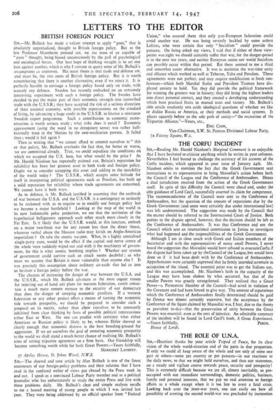SIR,—The shrewd and sane article by Alan Bullock is one
of the finest statements of our foreign-policy problems and their solution that I have read in the confused welter of views put abroad by the Press week in and out. I speak as a convinced Labour Party member and as a political journalist who has unfortunately to study the entire Press and live With these problems daily. Mr. Bullock's clear and simple analysis recalls to me a heated meeting of young people to which I was invited last year. They were being addressed by an official speaker from "Federal
Union," who assured them that only pan-European federation could avoid another war. He was being severely heckled by some ardent Leftists, who were certain that only " Socialism " could provide the panacea. On being asked my views, I said that if either of these view- points was right we should certainly suffer that war, for the danger-period is in the next ten years, and neither European union nor world Socialism can possibly occur within that period. But there seemed to me a third and somewhat easier alternative. It was to maintain the war-time unity and alliance which worked so well at Teheran, Yalta and Potsdam. Those agreements were not perfect, and may require modification at fresh con- ferences—which both Marshal Stalin and President Truman have dis- played anxiety to hold. Yet they did provide the political framework for winning the greatest war in history; they did bring the highest leaders into direct personal contact, and they created a developing understanding which bore practical fruits in mutual trust and victory. Mr. Bullock's able article resolutely sets aside ideological questions of whether we like or dislike Russia or America, or their methods and social systems. It places squarely before us the sole path of sanity—" the recreation of the Tripartite Alliance."—Yours, etc.,
ERIC Come, Vice-Chairman, S.W. St. Pancras Divisional Labour Party. 7A Fitzroy Square, W.1.


































 Previous page
Previous page